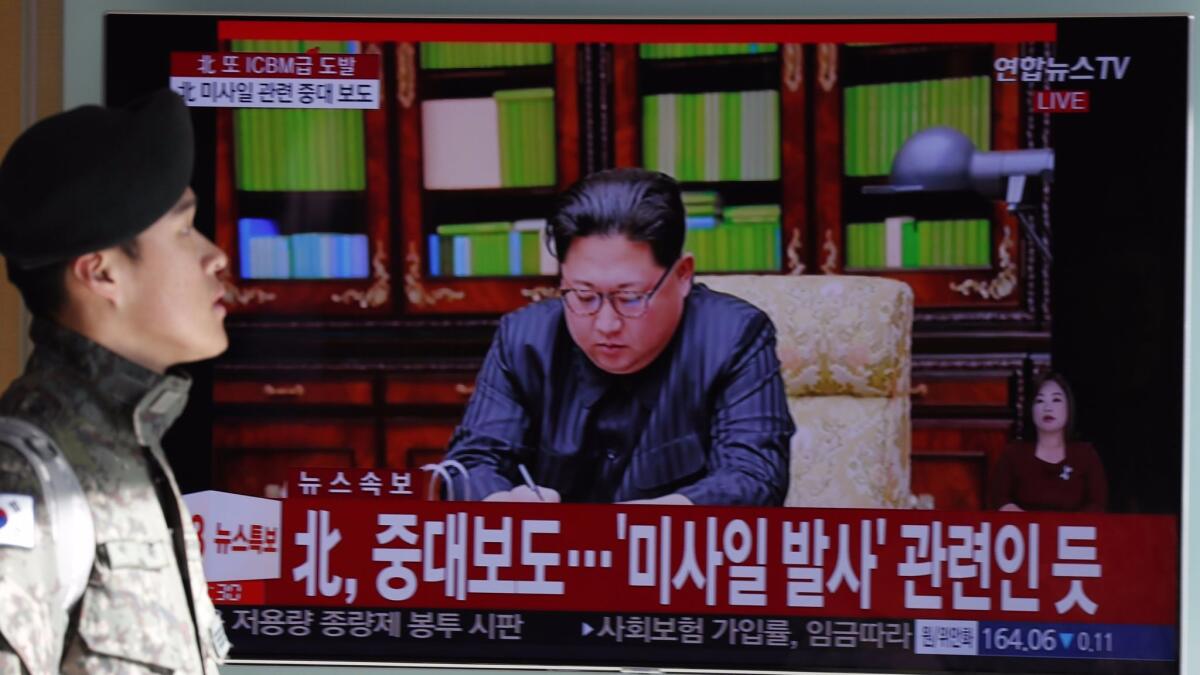Op-Ed: North Korea’s ICBM won’t cause a war but it will damage the United States’ standing in the world

Nuclear holocaust is the least likely outcome of North Korea’s latest leap forward in offensive capabilities. And if it were it to occur, it would probably be the result of shoot-from-the-lip bluster from President Trump rather than a calculated U.S. or North Korea strategy. Our biggest worry isn’t the future toll of a dubious war, but the toll bad leadership is already taking on our standing in the world.
South Korean President Moon Jae-in indirectly captured this point when, in response to this week’s successful test of a long-range missile by North Korea, he said, “We must stop a situation where North Korea miscalculates and threatens us with nuclear weapons or where the United States considers a pre-emptive strike.” Precisely at the moment South Korea would be expected to be most dependent on, and solicitous of, the United States, its president is instead considering how to counter an American move. That speaks volumes, as does Trump’s primary response to the launch: seeking the intervention of the Chinese in putting pressure on Pyongyang.
As great as the risk of nuclear war seems, common sense and self-interest are likely to prevail because that is what most often happens in international affairs. But it is shocking to realize that we are looking not to Washington but other actors in the drama — including the North Koreans and China — to be the source of reason in this crisis.
There are three possible outcomes to the Pyongyang-Washington duel.
To understand what will happen next, we need to consider the comparatively rational reasons behind the North Koreans’ nuclear program. It is not about global aggression. Kim Jong Un and his generals know that using such weapons would result in the end of North Korea. Rather, their drive to join the nuclear club is designed to make an outside attack on the country, or a foreign effort to depose the Kim regime, less likely. Perversely, for North Korea, gaining weapons of mass destruction is an existential choice.
Kim recognizes that no nation, not even one breathing “fire and fury,” has the power to take his weapons away. Military force is not a realistic option. There are no scenarios for an attack on North Korea that do not produce horrific casualties in the South. And now, with the possible destruction of one or more U.S. cities on the table, it is even more certain we wouldn’t undertake the risk.
Economic pressure also won’t work — the North Korean state has shown complete indifference to its people’s suffering. Besides, China, North Korea’s main trading partner, has no interest in pushing its neighbor into complete collapse. It would trigger unrest on its border and weaken a useful ally.
Realistically, there are three possible outcomes to the Pyongyang-Washington duel. One is accidental war, the consequences of which would be so grave that it must be avoided at all costs. Another is that the North Koreans will continue to grow their nuclear weapons program indefinitely, Or, if the regime can be persuaded to freeze the program, the threat can be contained and, as we did with the Soviets, we can patiently seek collapse of the system from within.
Containment and patience is where this will end. It’s what China and Russia will lobby for; not, as Trump thinks, because they want to help us, but because they believe we will give up power to make it happen. China, although central to a deal, is not our “partner”; its interests diverge from ours. Along with the North Koreans, the Chinese have the most leverage in this situation, and they will likely get the best of the negotiations unless the U.S. is very skillful.
That. of course, would require a functioning, well-staffed State Department. But we don’t have one of those. Its ranks have been decimated by the Trump administration. In the end, even if the flawed temperament and deficient skills of America’s president do not get us all killed, the actions of his administration will lead to the long-term weakening of the U.S. position in Asia and beyond. Already, our allies trust us less.
We may one day look back on 2017 and note not just the nightmarish fears sparked by the words of an unhinged American president, but a disruption in world order, the first big international crises since 1945 in which the United States was no longer the most influential actor.
David Rothkopf is a senior fellow at the School of Advanced International Studies at Johns Hopkins University and a visiting scholar at the Carnegie Endowment for International Peace. His latest book is “The Great Questions of Tomorrow.”
Follow the Opinion section on Twitter @latimesopinionand Facebook
More to Read
A cure for the common opinion
Get thought-provoking perspectives with our weekly newsletter.
You may occasionally receive promotional content from the Los Angeles Times.










